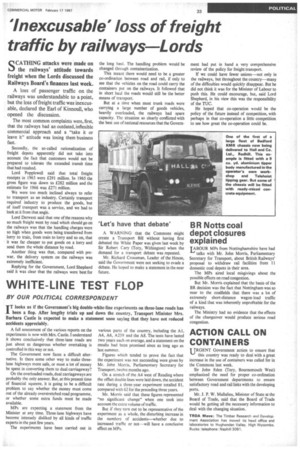'Inexcusable' loss of freight traffic by railways Lords
Page 35

If you've noticed an error in this article please click here to report it so we can fix it.
CATHING attacks were made on the railways' attitude towards freight when the Lords discussed the Railways Board's finances last week.
A loss of passenger traffic on the railways was understandable to a point, but the loss of freight traffic was inexcusable, declared the Earl of Kinnoull, who opened the discussion.
The most common complaints were, first, that the railways had an outdated, inflexible commercial approach and a "take it or leave it" attitude was losing them business fast.
Secondly, the so-called rationalization of freight depots apparently did not take into account the fact that customers would not be prepared to tolerate the extended transit time that had resulted.
Lord Popplewell said that total freight receipts in 1963 were £291 million. In 1965 the gross figure was down to £282 million and the estimate for 1966 was £271 million.
We were too much inclined always to refer to transport as an industry. Certainly transport required industry to produce the goods, but of itself transport was a service, and we had to look at it from that angle.
Lord Derwent said that one of the reasons why so much freight went by road which should go on the railways was that the handling charges were so high when goods were being transferred from lorry to train, from train to lorry and so on, that it was far cheaper to put goods on a lorry and send them the whole distance by road.
Another thing was that, compared with prewar, the delivery system on the railways was extremely inefficient.
Replying for the Government, Lord Shepherd said it was clear that the railways were best for the long haul. The handling problem would be changed through containerization.
This meant there would need to be a greater co-ordination between road and rail, if only to see that the vehicles on the road could carry the containers put on the railways. It followed that in short haul the roads would still be the better means of transport.
But at a time when most trunk roads were carrying a large number of goods vehicles, heavily overloaded, the railways had spare capacity. The situation so clearly conflicted with the best use of national resources that the Govern A WARNING that the Commons might create a Transport Bill without having first debated the White Paper was given last week by Sir Robert Cary (Tory, Withington) when the demand for a transport debate was repeated.
Mr. Richard Crossman, Leader of the House, said the Government were not seeking to evade a debate. He hoped to make a statement in the near future. ment had put in hand a very comprehensive review of the policy for freight transport.
If we could have fewer unions—not only in the railways, but throughout the country—many of the difficulties would quickly disappear. But he did not think it was for the Minister of Labour to push this. He could encourage, but, said Lord Shepherd, in his view this was the responsibility of the TUC.
He hoped that co-operation would be the policy of the future instead of competition, with perhaps in that co-operation a little competition to see how great the co-operation could be.




































































































































